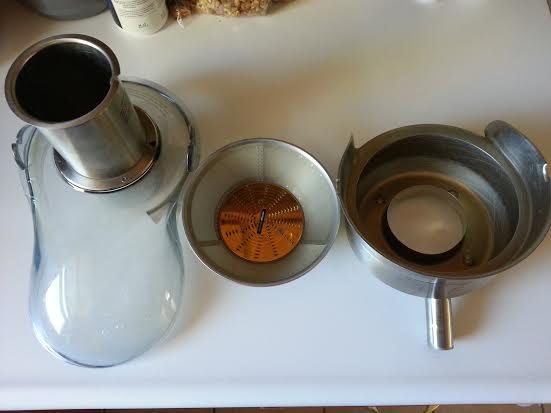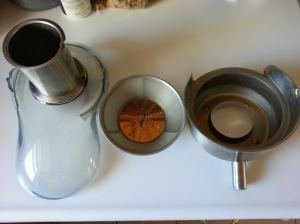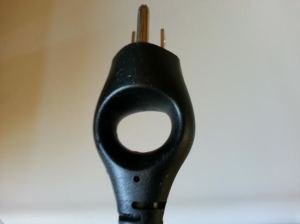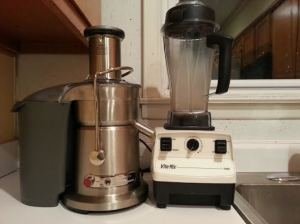Update 3/10/20. I get a lot of questions about what's the best juicer to use. To be honest, I didn’t think I'd ever start juicing. I always knew there were benefits but I just didn't want to take the time to do it. I've changed my mind. I’ve found a juicer that’s not only easy to clean but also makes juice fast. Here is my review of the Breville Juicer and I’ve also included the juice recipe I drink practically every day. I've also tried to answer questions about juicing too just in case anyone else is wondering about this and having a hard time finding an honest answer.
What's The Best Juicer?
For those who may not up to speed with juicing (I wasn't when I started looking into this) there are basically 2 different types of juicers out there:
1. Cold press juicers. Also called masticating juicers.
2. Centrifugal juicers
The Breville juicer is a centrifugal juicer. This means the juice is extracted when the food hits the juice extractor disk which spins a a high rate of speed.
Masticating / cold press juicers basically grind/chew up the food. These tend to be slower than centrifugal juicers and they don't make as much noise. An example of a cold press juicer is the Omega Juicer. I know people who have these juicers and love them.
People often debate as to which type is best. Those who like cold press juicers (like the Omega) often say they are best for preserving the enzymes and other nutrients in the food. They say that centrifugal juicers (like the Breville), heat the food up a bit, thus destroying the enzymes and other nutrients.
I've looked into this stuff and I can say this about it:
1. I've never seen a study comparing enzyme or nutrient content in juice made with different types of juicers. If anyone has please share it and I'll update this review.
2. I'm skeptical if the enzymes in food can make it through the digestion process in the body. If I'm right, then all this talk about enzymes being destroyed by centrifugal juicers is pointless.
3. In the Breville juicer I have, the juice comes out at basically the same temp as when it was in the refrigerator. So, even if enzymes do survive the juicing process, they are likely the same as in cold-press juicers.
As I was writing this, I became curious about how cold the extracted juice came out. So, I made some juice with the recipe I share below, and put a digital thermometer in the juice after I poured it in the glass.

As you can see from the picture, the temperature was too low for the thermometer to read. The glass was also cold to the touch, which is another reason I don't think there is a difference in the type of juice between centrifugal juicers and cold-press juicers. I think in the end, it all comes down to what you like best.
Why I Picked The Breville Juicer
I didn't start juicing to “cleanse” my body but rather as a way to get more plant nutrients that I might not be getting. I’ve had my Vitamix since 2002.So if you want a great blender, that's 
A few months ago I saw a documentary called Fat Sick and Nearly Dead, which told the story of a guy who lost a lot of weight juicing. It was the juicer that I noticed the most. Whatever this guy put in the juicer, the juice shot right out immediately! I've never seen a juicer do that before. That's the Breville Juicer and it's what I purchased.
How Fast Does Breville Juice?
The model I have is called the Juice Fountain because it’s almost like a soda fountain – the juice shoots out of the machine as soon as you put fruits or veggies into it. When I saw it, I called it “The Vitamix of Juicers” because it juiced fruits and veggies so quickly.
How Powerful Is The Breville Motor?
The motor is 1000 watts and has 2 speeds: low and high. I put it on high for everything and it has no trouble juicing whatever I toss into it. When it's on high, the motor moves at 13,000 revolutions per minute. When it's on low, it moves at 6,500 RPM.
How Loud Is Breville?
I wont lie, the Breville juicer is loud. It's about the same noise level as my Vitamix. For what I use it for -see my recipe below – it's only on for about 30 seconds at the most.
The Juice Jug
The Juice Jug is what collects the juice that you make. It’s made of plastic and can hold 1.1 quarts. It’s unique in that it's designed to separate the froth from the juice. That’s a selling point for me as I don’t like the froth.
Is There Pulp?
I've made juice that contained carrots, spinach, celery, red cabbage, kale, beats and more. I've never seen any pulp or chunks of fruits or veggies in the juice I've made.
Is Breville Easy To Clean?
VERY easy. This was one the main reasons I bought this Juicer. I can clean my Breville in about 1 minute. There are only 3 things to clean and they come apart in under 5 seconds. All 3 main pieces are top of the dishwasher safe. Cleaning it by hand takes only about 1 minute. I like to clean the juicer as soon as I’m done so none of the food hardens on it.
The juicing disk filter –the middle thing in the picture above that actually extracts the juice – is made of titanium. Breville says it extracts 30% more juice and 40% more vitamins than other juicers. The juicing disk takes about 30 seconds to clean and they provide a cleaning brush to do this.
Is The Breville Juicer Messy?
No. When I make juice the pulp shoots into the pulp container, which is located in the back of the machine, without making a mess.
Tip: I put a plastic bag inside the container to make it easier to clean. So when I’m done, all I do is pull the bag out of the pulp container and toss it in the trash. No cleaning needed.
The Plug
The plug of the Breville juicer is actually what surprised me the most. It has a hole in the middle to make it easy to remove from a wall socket. I know that doesn’t sound like much, I thought that was just the neatest innovation I've seen in a long time.
American companies could take a lesson from Breville on this unique design.
Is Juicing Right For You?
Juicing fruits and vegetables can increase the sugar content (and glycemic index) of the juice. This might raise blood sugar levels and as such, be a problem for diabetics. Adding more vegetables to juice might reduce the sugar content of the juice as veggies tend to have less sugar than fruits.
My Breville Juice Recipe
The Breville Juicer comes with a recipe book. I tried a few and they actually tasted pretty good. Now I experiment on my own. Heres a quick 
- 1 apple
- 3 cherry tomatoes
- Handful of spinach
- 2-3 carrots
- 2 celery sticks
I like to add the tomatoes first then spinach and then the apple. I usually alternate between the celery and carrots.
This juice tastes good! I pour the juice into a glass with ice and let it chill for a minute while I wash the juicer. It only takes about 1.5 minutes to clean everything.
Breville Juicer vs. Vitamix
Both the Vitamix and the Breville juicer are good machines. As I said before, I LOVE my Vitamix. It gets used pretty much every morning to make a breakfast smoothie. Both are great machines that help people significantly increase fruit and vegetable intake. In the end, it comes down to what you like. The table below outlines some basic differences and similarities between both machines.
| Breville Juicer | Vitamix |
|---|---|
| Easy to clean | Easy to clean |
| Quicker absorption of nutrients | Slower absorption of nutrients |
| extracts fiber/pulp | Includes fiber/pulp |
| Increase fruit /veggie intake | Increase fruit/veggie intake |
| Not as satiating (due to less fiber) | More satiating (because of more fiber) |
| Loud | Loud |
| Lot's of nutrients | Lot's of nutrients |
| 1 year warranty | 7 year warranty |
Because I'm somewhat space limited in my kitchen, before I bought this, I wanted to make sure both were about the same size. In case you are the same way, here is a side by side comparison of both machines:
Juicing Benefits
For me, juicing is not about cleansing the body. Our bodies are very good at cleansing themselves naturally. I started juicing 





Joe – Thank you so much for the tip about using a plastic bag – genius! I’m going to try it for my next juice session.
Cindy, you are very welcome! I wish I could take credit for the plastic bag trick but I learned it from somebody else 🙂
which one is best for auto cleaning ??
Hi Martha, The Breville Juice Fountain cleans in less than 5 minutes. It’s very easy to clean.
Got it❢ Thanks again Joe 🙂
Hi Joe,
Really enjoy your site, informative and helpful with your knowledge and love the way you do the research based on true science.
My first search was protandim’s information as a lot of website recommends as a preventive supplement which brought me to your interesting site.
Ok, here is my question about the juicer,
will centrifugal juicer add air into the juice and oxidize a lot quicker? Thanks.
Hi Daniel, that’s a good question and I’m honesty not sure of the answer. I know some websites say it does this but I can’t find any proof either way. Some sites also talk about how centrifugal juicers heat the juice, which my little test showed did not happen (with the Breville juicer at least).
My gut instinct says that it does not increase oxidation but I could not point you to any proof of this. Are you asking because you are going to not drink the juice immediately?
Joe, thanks for the reply. Not really, just planing to bring the juice to work in a sealed container.
And do you have ebook on the “nutritional supplements” or just paperbacks? Planing to get one copy as I am sure I won’t be disappointed.
Thanks again for your great site and your work.
Hi Daniel, I doubt if there will be any significant change to the juice by the time you take it to work and drink it there. Right now my book is in paperback although I do have plans of making it a kindle book, hopefully this year. If you sign up to my email newsletter, you will be the first to know when that happens 🙂
i truly despised the breville juicer and ended up giving it away.
years later when i wanted to start juicing again i got the Omega® Model J8006 Nutrition Center HD Juicer and LOVE LOVE LOVE it!!! it’s slower but so much better and talk about easy to clean!!!!! this juicer is set up RIGHT.
Aubergine, my sister-in-law uses the Omega juicer and she loves it. I did consider it but opted for the Breille because it was faster. Either way, I’m glad you are juicing 🙂
I got rid of my Breville cause it wasted so much liquid. I agree with Joe, the omega vrt330 is a night and day product. It’s really juicing. I juice once or twice a month and make about 8 quarts which I freeze in mason quart jars. Works for me.
Deb, that’s a great idea! 🙂
I wish my Breville Plus components were not plastic. I have been juicing for 2.3 years and the plastic has a film that I can’t get rid of. I did try the dish washer…still did not prevent the film. Any suggestions?
Corliss, I wish I had an answer for you. Have you tried reaching out to Breville about this to see if they have any suggestions? I really like mine. I’m sure the film isn’t harmful. Look at it this way, it means you are using it, which is the important thing 🙂
I juice about 3 days per week by quickly pre chopping a carrot, beet, celery stalk, and an apple and blending them on high in a standard blender. I then pour it into a nylon paint strainer bag stretched over a pitcher ($2 for 2 at Home Depot).
After it drains for a minute I pull the bag out and squeeze the juice until all that is left is some dried (still moist) pulp. I pour it in a glass with about a tablespoon each of unpasteurized apple cider vinegar and fresh squeezed lemon, as well as a few dashes each of cayenne, ginger, and turmeric.
I get it down the hatch quickly and save the pulp to put in healthy soups, stews, chili, marinara sauce, etc. Some people put it in their compost or mix with their pet’s food.
Just make sure that everything you use is nice and cold… veggies, blender pitcher, pitcher you squeeze it in, knife, etc. I put all my utensils in the freezer for a while. You can find many videos on youTube showing reputable fitness experts using this method.
Robin, wow you are a hard-core juicer! That’s fantastic! I agree 100% that the juice tastes best cold. I didn’t show it in my review -because I wanted to check the temperature of the juice when it came out of the juicer – but I always drink the juice from a glass filled with ice. I let it chill in the glass for a minute while I’m cleaning the juicer 🙂
I thought you mentioning the whole in the plug funny! Alot of our appliances in Australia and New Zealand have them. I never really noticed that it wasn’t common.
Dee, its not common here. I’ve never seen a plug in the US that has one. I thought the hole in the plug was one of the best innovations of the juicer 🙂
You are correct that enzymes in food won’t survive digestion. They are large proteins that can’t be absorbed into the bloodstream intact and functional in any significant amount. If they did get into the bloodstream, a functioning immune system would identify them as foreign proteins and mount an attack against them. In an amount large enough to do anything that might be useful, this would cause a fever, allergic reaction, or anaphylactic shock.
There is a paper that reports an extremely low level of bromelain (enzymes from pineapples) being absorbed. Only about 10 micrograms was absorbed from 3 grams/day dose, which really isn’t significant. That’s a microscopic amount.
http://ajpgi.physiology.org/content/273/1/G139
If food enzymes have any value at all, it’s while they are in the gastrointestinal tract helping to digest food. Some digestive enzymes made by bacteria are available as supplements to aid digestion, and they are effective. I’m not aware of any studies indicating food enzymes have any value to aid digestion in the human body, though pineapple and papaya enzymes are commonly used in meat tenderizer preparations. The raw fruit has this effect too, and it can be used to tenderize meat as a sort of pre-digestion process. This is at most a minor benefit for normal people, because our bodies make plenty of enzymes that digest food quite well without any assistance from food enzymes.
One of the arguments made by raw foodists is that you need active enzymes from food to avoid depleting your body of enzymes. That’s ridiculous. If your body needs more enzymes, it will make more enzymes. You can’t run out of enzymes any more than you can run out of saliva or stomach acid. If you did have a problem making enzymes, you’d have a problem far more serious than a lack of enzymes. You’d probably have an organ failure, such as failure of the pancreas due to cancer or an autoimmune attack. You don’t treat that with raw vegetable and fruit juices.
Mark, thanks for the feedback and for that study. I did hear a study pertaining to enzyme absorption existed. I’ve added this to my files for future reference.